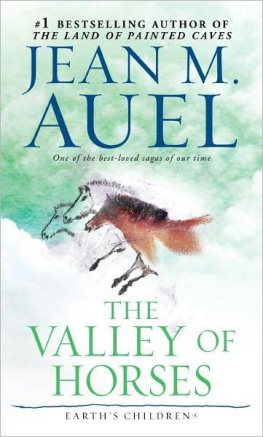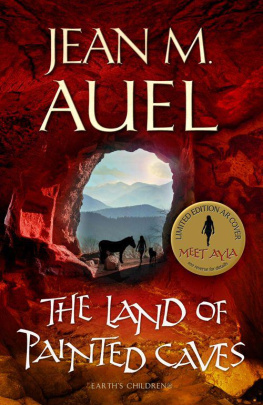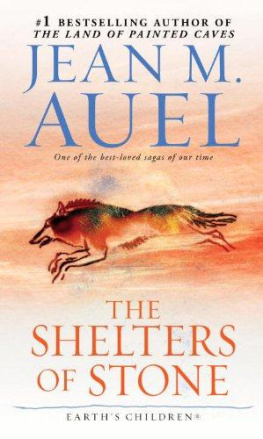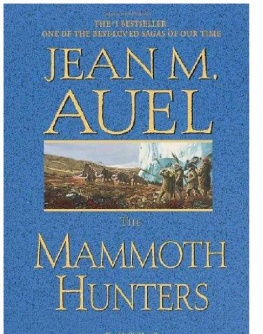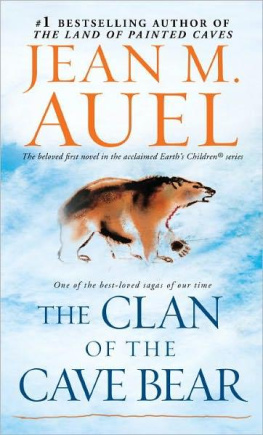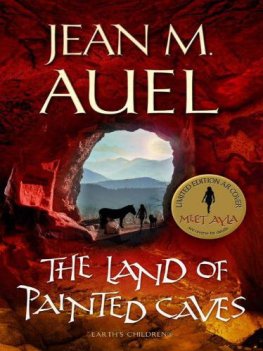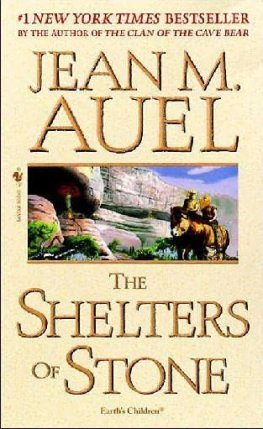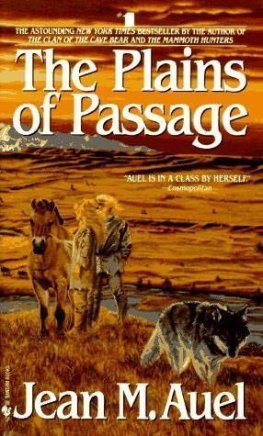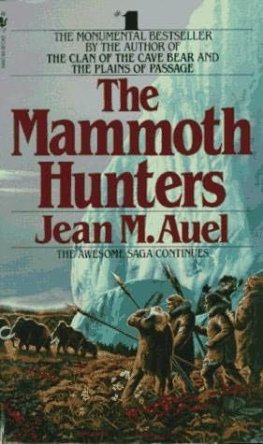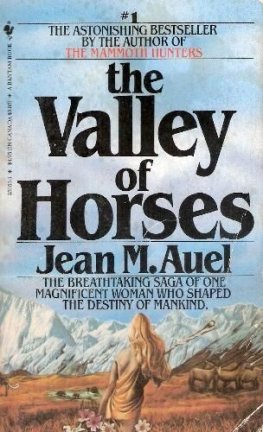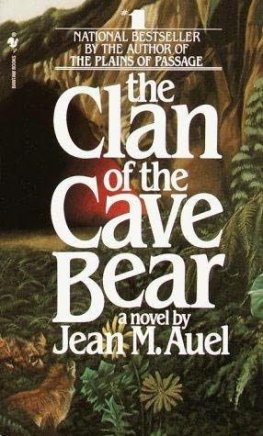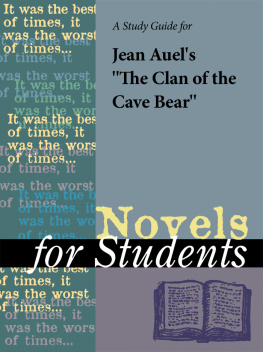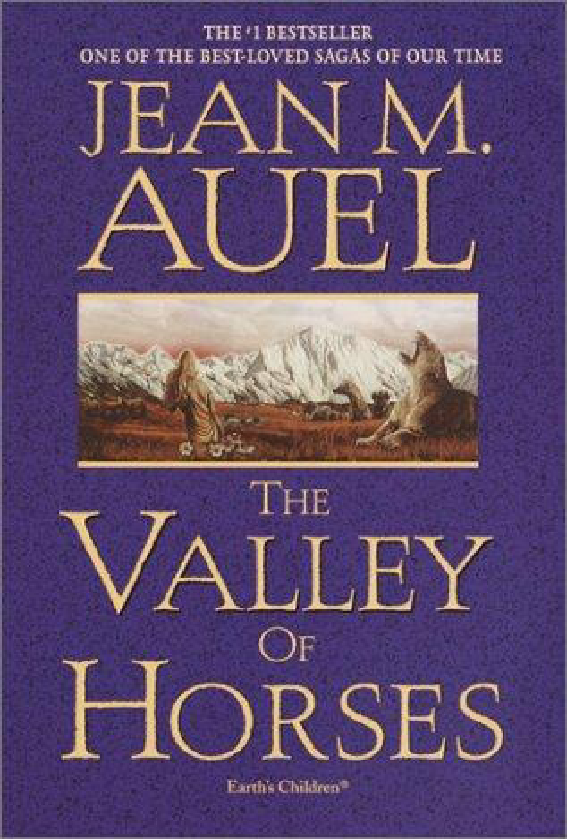

giving in to her fatigue, and when she saw the rocky shore, with a resolute effort, she took control. She forced her legs to kick, pushing to reach the land before the river carried her around the point. Closing her eyes, she concentrated on keeping her legs moving. Suddenly, with a jolt, she felt the log grate against the bottom and come to a stop. Ayla couldn't move. Half submerged, she lay in the water still clinging to the branch stubs. A swell in the turbulent stream lifted the log free of the sharp rocks, filling the young woman with panic. She forced herself to her knees and shoved the battered tree trunk forward, anchoring it to the beach, then fell back into the water. But she couldn't rest long. Shivering violently in the cold water, she made herself crawl onto the rocky spit. She fumbled with the knots in the vine, and, with that loosened, she hauled the bundle to the beach. The thong was even more difficult to untie with her trembling fingers. Providence helped. The thong broke at a weak spot. She clawed the long leather strap away, pushed the basket aside, and crawled on the bearskin and wrapped it around her. By the time her shivering stopped, the young woman was asleep.
Ayla headed north and slightly west after her perilous river crossing. The summer days warmed as she searched the open steppeland for some sign of humanity. The herbal blossoms that had brightened the brief spring faded, and the grass neared waist high. She added alfalfa and clover to her diet, and welcomed the starchy, slightly sweet groundnuts, finding the roots by tracing rambling surface vines. Milk-vetch pods were swelling with rows of oval green vegetables in addition to edible roots, and she had no trouble distinguishing between them and their poisonous cousins. When the season for the buds of day lilies passed, the roots were still tender. A few early-ripening varieties of low-crawling currents had begun to turn color, and there were always a few new leaves of pigweed, mustard, or nettles for greens. Her sling did not lack for targets. Steppe pikes, souslik marmots, great jerboas, varying hares -- gray brown now instead of winter white -- and an occasional, omnivorous, mouse-hunting giant hamster abounded on the plains. Low-flying willow grouse and ptarmigan were a special treat, though Ayla could never eat ptarmigan without remembering that the fat birds with the feathered feet had always been Creb's favorite. But those were only the smaller creatures feasting on the plain's summer bounty. She saw herds of deer -- reindeer, red deer, and enormous antlered giant deer; compact steppe horses, asses, and onagers, which resembled both; huge bison or a family of saiga antelope occasionally crossed her path. The herd of reddish brown wild cattle, with bulls six feet at the withers, had spring calves nursing at the ample udders of cows. Ayla's mouth watered for the taste of milk-fed veal, but her sling was not an adequate weapon to hunt aurochs. She glimpsed migrating woolly mammoths, saw musk oxen in a phalanx with their young at their backs facing down a pack of wolves, and carefully avoided a family of evil-tempered woolly rhinoceroses. Broud's totem, she recalled, and suitable, too. As she continued northward, the young woman began to notice a change in the terrain. It was becoming drier and more desolate. She had reached the ill-defined northern limit of the wet, snowy continental steppes. Beyond, all the way to the sheer walls of the immense northern glacier, lay the arid loess steppes, an environment that existed only when glaciers were on the land, during the Ice Age. Glaciers, massive frozen sheets of ice that spanned the continent, mantled the Northern Hemisphere. Nearly a quarter of the earth's surface was buried under their unmeasurable crushing tons. The water locked within their confines caused the level of the oceans to drop, extending the coastlines and changing the shape of the land. No portion of the globe was exempt from their

the young mare to carry on her back, was the next logical move. It took a little more thought to come up with a pair of baskets on either side of the horse, attached to a wide thong tied around her middle. But with the addition of the second basket, she began to perceive some of the advantages of harnessing the strength of her four-legged friend. For the first time, she was able to bring to the cave a load that was larger than she alone could carry. Once she understood what she could accomplish with the help of the horse, her methods changed. The entire pattern of her life changed. She stayed out longer, ranged farther afield, and returned with more produce, or plant materials, or small animals at one time. Then she spent the next few days processing the results of her forays. Once when she noticed wild strawberries were beginning to ripen, she searched over a large area to find as many as she could. Ripe ones were few so early in the season, and far between. It was nearly dark when she started back. She had a sharp eye for landmarks which kept her from getting lost, but before she reached the valley, it was too dark to see them. When she found herself near the cave, she relied on Whinney's instincts to guide them, and on subsequent trips she often let the horse find their way back. But afterward she took along a sleeping fur, just in case. Then one evening she decided to sleep out on the open steppes, because it was late and she thought she'd enjoy a night under the stars again. She made a fire, but, cuddled up beside Whinney in her fur, she hardly needed it for warmth. Rather it was a deterrent to nocturnal wildlife. All the steppes creatures were wary of the smell of smoke. Raging grass fires sometimes burned unchecked for days, flushing out -- or roasting -- everything in their path. After the first time, it was easier to spend a night or two away from the cave, and Ayla began to explore the region east of the valley more extensively. She wasn't quite admitting it to herself, but she was looking for the Others, hoping she would find them, and afraid that she might. In one sense, it was a way of putting off the decision to leave the valley. She knew she would soon have to make preparations to go if she was going to take up her search again, but the valley had become her home. She didn't want to leave, and she was still worried about Whinney. She didn't know what some unknown Others might do to her. If there were people living within range of her valley by horseback, she could, perhaps, observe them first before making her presence known, and learn something about them. The Others were her people but she couldn't remember anything of her life before living with the Clan. She knew she had been found unconscious beside a river, half starved and burning with infected cave lion gashes. She was near death when Iza picked her up and carried her with them on their search for a new cave. But whenever she tried to recall anything of her earlier life, a nauseous fear overcame her along with an uneasy sense of the earth rocking beneath her feet. The earthquake that had cast a five-year-old girl alone in the wilderness, left to the mercy of fate -- and the compassion of people who were much different -- had been too devastating for her young mind. She had lost all memory of the earthquake and of the people to whom she had been born. They were to her as they were to the rest of the Clan: the Others. Like the indecisive spring, with its swift changes from icy showers to warm sun and back again, Ayla's inclination shifted from one extreme to the other. The days were not bad. While growing up, she had often spent her days roaming the countryside near the cave gathering herbs for Iza or, later, hunting, and she was accustomed to solitude then. So in the mornings and afternoons, when she was busy and active, she wanted nothing more than to stay in the sheltered valley with Whinney. But at night, in her small cave with only a fire and a horse for company, she yearned for another human being to ease her loneliness. It was more difficult being alone in the warming spring than it had been all through the long cold winter. Her thoughts dwelled on the Clan and the people she loved, and her arms ached to hold her son. Every night
Next page
